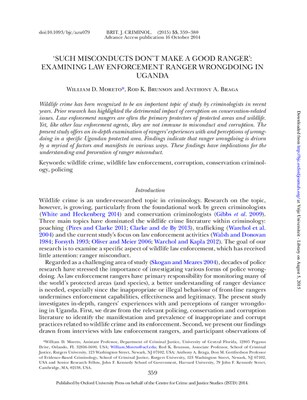Such Misconducts Don’t Make a Good Ranger Examining Law Enforcement Ranger Wrongdoing in Uganda

Author(s): Moreto, William D., Rod K. Brunson, and Anthony A. Braga
Publication Date: 2015
DOWNLOAD FILEThis case study offers an in-depth examination of rangers’ experiences with and perceptions of wrongdoing in a specific Ugandan protected area.
Key Points in Document:
- This case study offers an in-depth examination of rangers’ experiences with and perceptions of wrongdoing in a specific Ugandan protected area.
- Prior research has highlighted the detrimental impact of corruption on conservation-related issues. Law enforcement rangers are often the primary protectors of protected areas and wildlife. Yet, like other law enforcement agents, they are not immune to misconduct and corruption.
- Findings indicate that ranger wrongdoing is driven by a myriad of factors, including personal factors, organizational or systematic factors, socio-cultural context and moral cynicism. Wrongdoing can be categorized into different three general categories: dereliction of duty, ancillary and/or incidental involvement in criminal activities, and principal transgressor of illegal activities.
- A few preventative measures are suggested for consideration including:
- Building internal capacity with a focus on organizational integrity and leadership
- Development of a separate internal affairs section
- Use of a crime-specific approach based on situational crime prevention that is focused on reducing opportunities to offend as well as conditions for ranger discretion.
- Given the novel approach used and the paucity of research in this area, this case-study is highly recommended for CLG members working in law enforcement areas where corruption is a concern.
Related Learning Questions:
- How should target audiences and actions be selected for capacity building for CWT enforcement?
- What are the attributes of institutions that maintain and improve competencies over time?
- What institutional conditions (internal or external to a given agency, or across agencies) are necessary for staff to have the authority, be motivated, and have other barriers removed, so that they can take targeted actions?
Citation: Moreto, William D., Rod K. Brunson, and Anthony A. Braga. "‘Such Misconducts Don’t Make a Good Ranger’: Examining Law Enforcement Ranger Wrongdoing in Uganda." British Journal of Criminology 55.2 (2015): 359-380.

